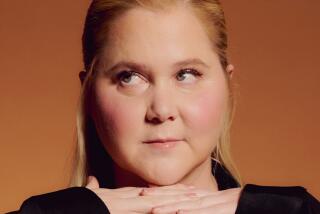The Ultimate Secret
- Share via
We had already cleared some of the preliminary relationship hurdles. You know, the ones about money, religious preferences and figuring just how long I could stand listening to the audiotape of “Men Are From Mars, Women Are From Venus” during daily commutes.
Those were a cinch. The big test came unexpectedly, when I invited her over one night to explore the wonders of the World Wide Web on my new computer. Oblivious to the trial I was bringing upon myself, I talked her through the “I Love Lucy” screen-saver demo and right up to the brink of the Internet when, to my utter horror, it happened:
That little screen popped up, asking for my password.
Amy sat there, a Cheshire grin spreading across her Cosmo face, her fingers poised for the kill in midair as she asked: “So, what should I type?”
I was dumbstruck. “Uh, I better take care of that myself,” I said, swiping the keyboard off the desk and turning my back so she couldn’t see me enter ********.
Talk about your awkward moments.
God knows, I’ve tried to be open and sensitive. Since we’ve started dating, I’ve shared my cholesterol count, my (approximate) weight, my hopes, my dreams, my fears, even the intricate workings of my peculiar personal demons. We’ve waxed philosophical over the Origins of Divine Truth, childhood traumas and the efficacy of ginkgo biloba extract pills.
But my computer password? You’ve got to be kidding.
This isn’t your father’s game show. The importance of our computer incantations--what they say about a person, whether they should be shared with a lover or a spouse--is emerging as a defining issue in the power struggle between men and women as civilization creeps toward the shore of the next century.
So says a leading expert in this area, namely my own therapist, John, who, when I regale him with the episode of Amy and the password during one of our weekly sessions, puts his hand on his chin, closes his eyes, smiles, exhales and nods knowingly.
John confirms that people would rather disclose their mother’s bra size than give up their computer passwords. The emotional tug-of-war over this issue has been played out with increasing frequency during couples therapy, he assures me.
The reason: Passwords are regarded by many as the last refuge of privacy and power in a technologically intrusive world, where personal data and preferences bleed out into strange hands through databases, online services and bar codes. In a very real sense, passwords have become our daily affirmations, our cerebral gateways to what Hemingway called that clean, well-lighted place.
“Seldom in our life does one word give us power like that,” says John, adding that these words serve as intellectual keys to a “huge, huge electronic safe, where we keep our private everythings.”
Thus, people who have conceived children together and co-signed jumbo home loans pull up short of telling each other this secret, leaving their everythings safely locked away.
To be sure, some of the emotional reluctance is nothing more than self-preservation. More than a few people don’t want their partners to know about their propensity for playing footsie in the chat room. Or about those raunchy bytes downloaded to hard disk for private amusement.
Yet most of the time it is the mere secrecy, and not the content, that is the point, says John: “We don’t want our wives and husbands to know about these things and I don’t think it’s about having an affair or being secretive or evil somehow. It’s just like, ‘Doggone it, this is mine and I don’t want anyone else to see it.’ ”
Locked in our cyber-closets, we can dream. John’s example is of the daytime nerd who makes nighttime romps through the online classifieds, looking for the red Corvette he knows he’ll never be able to afford. Securely hidden behind his password, the fantasy remains a possibility, alive, safe from challenge, ridicule--even ugly reality. “He doesn’t want someone to see the literature on the table and say, ‘Hey, what are you thinking here? We can’t afford this!’ ”
For women, passwords have come to symbolize the privacy they need to regenerate emotionally, my shrink contends. It is the hot bubble bath with Yanni playing softly on the CD while the husband and kids are locked out.
For men, the steadfast refusal to give up their computer codes is being John Wayne in the Wild West, a way to feel free and uncontrolled 10 minutes after they’ve been told to take out the garbage and coil the garden hose. In our minds, it is continuing membership in the traditional male bastions that have otherwise disappeared.
“This seems to have become the men’s club we don’t have anymore, where we could go smoke cigars and drink brandy,” says John. “It’s the fishing hole, our private place where we can chew tobacco and spit.”
Whatever the motivation, passwords and their ilk--ATM personal identification numbers and voice-mail codes--have become the modern sword and shield in the gender wars. The skirmishes are everywhere.
At my local bank, the manager tells me about a customer who was asked to punch in her PIN while her husband was sitting next to her at the service desk. She tried to do it quickly and discreetly, but her husband wasn’t fooled. He figured out she was using the name of an old flame. They had it out before they even reached the lobby.
In Florida, my friend Phil uses computer secrecy as an instrument of exquisite marital torture. When wife Linda enters the room, Phil dramatically logs off and smiles sheepishly. This is a sure-fire conversation starter, he reports.
During a recent Monday night football game, I hoisted a beer with a former neighbor, a local police officer. At one point, we joked about our recent exchange of mildly macho e-mail.
“By the way, does your wife have your password?” I asked, as my smile dropped at the thought.
He straightened up. “You know, that’s one thing I’m very proud of. She’s never asked.”
“C’mon . . . .”
“Really. But she did once ask me for the code to my voice mail. I said, ‘Honey, if you ask me again, I’m going to have that voice mail disconnected. You know I get a lot of informants who call me with confidential informa-tion . . . ,” he said with a glint in his eye.
Back at home, Amy is still trying her hand at hacking. Shortly after my revelatory session with John, I come upon her staring intently into the computer monitor, her tongue dangling from the side of her mouth.
“I think I’ve figured it out,” she says, proceeding to type in the most logical of guesses. She tried my children’s names. She tried my mother’s maiden name. She tried “football,” “gnocchi,” “paranoid” . . . even “Clyde,” the dog.
Wrong. Wrong. Wrong.
“Oh, I don’t care what your damn password is anyway!” she finally says, storming from the room.
A mere amateur. Everybody knows you don’t use familiar names, even spelled backward. Off limits, as well, are telephone numbers, social security numbers, birth dates, addresses. Some high-tech security nuts even eschew any word that can be found in any dictionary or on any spelling list in the world.
The best strategy is to mix letters and numbers so they can be memorized and keyboarded quickly, as the hand is quicker than the eye. But since few of us are entrusted with the secret formula for Coca-Cola, we opt for codes that are more middle-of-the-road, more comfortable, more psychologically revealing. Like the one used by a colleague. While working on a story with him years ago, I accidentally saw him type in the password “KICKBUTT.” Needless to say, I did not get the top byline on our story.
As for my password, I’ll only allow you this: It has to do with childhood nostalgia, a young boy’s breath frozen as a stream in the frigid winter air . . . I’ll start to cry if I say anything more. So far, I’ve managed to keep this to myself, despite being subjected to several guilt trips, the silent treatment and tearful lectures about the necessity for mutual trust. I swear, even if she forces me to listen to that infernal “Mars/Venus” tape one more time, my lips will be sealed.
Still, Amy is relentless. “I talked to Mary today,” she says, casually tossing out a co-worker’s name during a recent commute home. “She said she and her husband have the same password. She said she doesn’t understand why it’s such a big deal . . . .”
All I can say is: Gentlemen, cover your asterisks.


